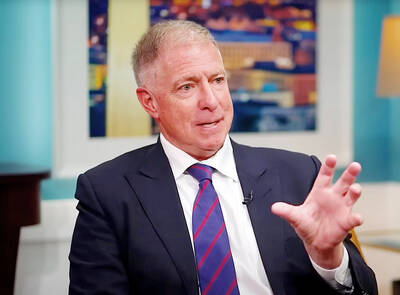People should be worried about the independence of local media as it carried a large amount of embedded marketing paid for by the central government or China, the Foundation for the Advancement of Media Excellence said on Monday.
The foundation cited US watchdog Freedom House’s recent report on media freedom, which concluded that it was worrisome that Taiwanese newspapers inserted news stories from Chinese state media and published news reports paid for by Chinese authorities without informing readers.
Such practices harmed people’s right to knowledge and could easily affect the local media’s independence, it said.
About 200 “ads” paid by Chinese government agencies were published in local newspapers last year, 119 of which were published following the signing of the Economic Cooperation Framework Agreement (ECFA) between Taiwan and China in June 2010, said the foundation’s report, which was released last month.
Moreover, Taiwan’s five biggest local newspapers published a total of 1,349 government advertisements in the second half of last year, the foundation’s report said.
In December last year — in the run-up to the Jan. 14 presidential election — the number of ads seen to favor the government reached 295, the highest monthly figure of the second half of last year, it said.
The Taipei City Government, for example, advertised the 2017 Universiade — which it will be hosting — and a major road project 26 times last month, with Taipei Mayor Hau Lung-bin’s (郝龍斌) photo appearing on more than 10 of the ads.
Other political figures, such as President Ma Ying-jeou (馬英九) and vice president-elect Wu Den-yih (吳敦義), were also frequently seen in similar government ads, the foundation said.

A total lunar eclipse coinciding with the Lantern Festival on March 3 would be Taiwan’s most notable celestial event this year, the Taipei Astronomical Museum said, urging skywatchers not to miss it. There would be four eclipses worldwide this year — two solar eclipses and two lunar eclipses — the museum’s Web site says. Taiwan would be able to observe one of the lunar eclipses in its entirety on March 3. The eclipse would be visible as the moon rises at 5:50pm, already partly shaded by the Earth’s shadow, the museum said. It would peak at about 7:30pm, when the moon would

DEFENSE: The US should cancel the US visas or green cards of relatives of KMT and TPP lawmakers who have been blocking the budget, Grant Newsham said A retired US Marine Corps officer has suggested canceling the US green cards and visas of relatives of opposition Taiwanese lawmakers who have been stalling the review of a proposed NT$1.25 trillion (US$39.7 billion) special defense budget. The Executive Yuan has proposed the budget for major weapons purchases over eight years, from this year to 2033. However, opposition lawmakers have refused to review the proposal, demanding that President William Lai (賴清德) first appear before the Legislative Yuan to answer questions about the proposed budget. On Thursday last week, 37 bipartisan US lawmakers sent a letter to Legislative Speaker Han Kuo-yu (韓國瑜), the heads

A New York-based NGO has launched a global initiative to rename the nation’s overseas missions, most of which operate under the name "Taipei," to "Taiwan Representative Office (TRO)," according to a news release. Ming Chiang (江明信), CEO of Hello Taiwan, announced the campaign at a news conference in Berlin on Monday, coinciding with the World Forum held from Monday through Wednesday, the institution stated in the release. Speaking at the event, Democratic Progressive Party Legislator Huang Jie (黃捷) said she believed this renaming campaign would enable the international community to see Taiwan

TOO DANGEROUS: The families agreed to suspend crewed recovery efforts that could put rescuers in danger from volcanic gases and unstable terrain The bodies of two Taiwanese tourists and a Japanese pilot have been located inside a volcanic crater, Japanese authorities said yesterday, nearly a month after a sightseeing helicopter crashed during a flight over southwestern Japan. Drone footage taken at the site showed three bodies near the wreckage of the aircraft inside a crater on Mount Aso in Kumamoto Prefecture, police and fire officials said. The helicopter went missing on Jan. 20 and was later found on a steep slope inside the Nakadake No. 1 Crater, about 50m below the rim. Authorities said that conditions at the site made survival highly unlikely, and ruled